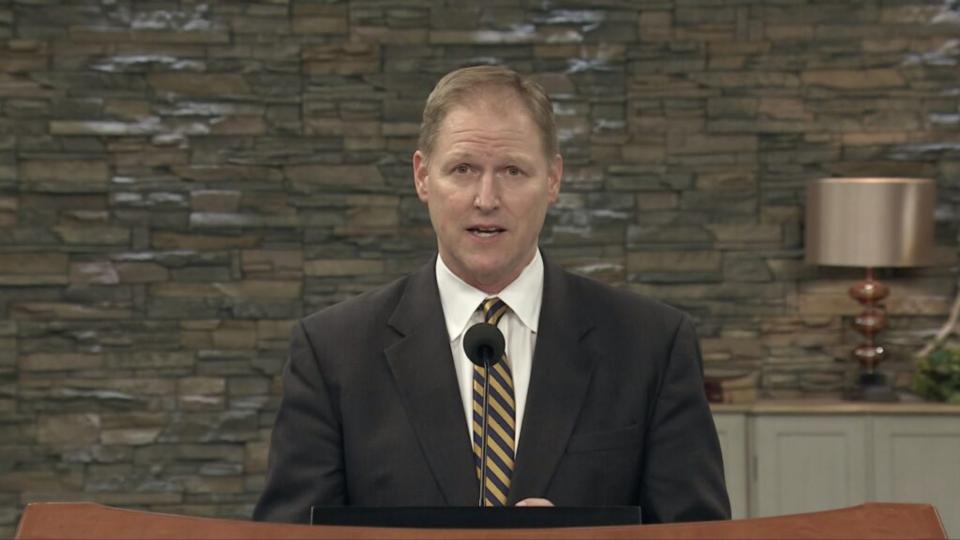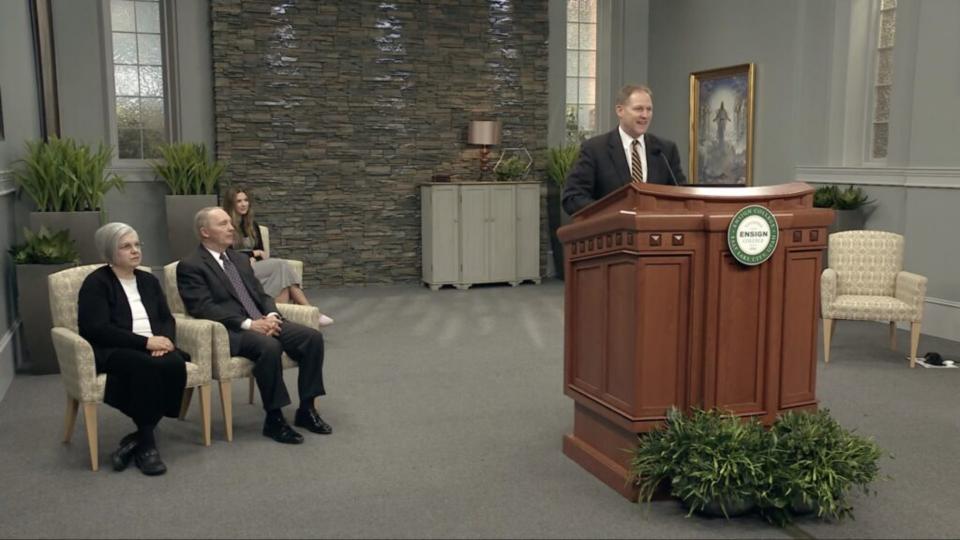
This story appears here courtesy of TheChurchNews.com. It is not for use by other media.
By Valerie Walton, Church News
There is a tendency to over-compartmentalize one’s life, separating personal life from Church life, school life or work life and thinking they can never mix. Many think they can’t even talk about religion at work — where most people will spend more than half of their waking hours.
This separation is a mistake and “causes us to miss out on blessings and opportunities to bless others,” Elder Mark A. Bragg, General Authority Seventy, said during his Ensign College devotional address broadcast on March 9.
“There is no doubt that we can freely share who we are in every aspect of our lives.”
Elder Bragg taught about three Christlike attributes that would prepare students for their careers: faith, hope and charity.
These attributes will “not only make you a better disciple of Christ, but also a better associate, co-worker, manager and leader,” he said. “I have seen these attributes work miracles in the most challenging of industries in the most difficult of times.”
Why apply these Christlike attributes to the workplace?
First, all things are spiritual to the Lord, Elder Bragg said. “Everything that you do can increase your spirituality and draw you closer to the Lord. This eternal truth is not paused just because you are at work.”
Second, developing faith, hope and charity “leads us to Christ and helps us bless others as He would,” he said.
“These gifts should be central to our own spirituality, and form the basis of how we can lift those around us, including our co-workers.”
1. Faith
Faith is confidence in something, someone or a course of action. “When it is centered in Jesus Christ, the blessings include a confidence that the course of your life is acceptable to the Lord and that His blessings are available to you in this life,” Elder Bragg said. “It is a principle of true power when coupled with action.”
Elder Bragg has shown his faith in Christ at his workplace by keeping certain items in his office that identified him as a member of The Church of Jesus Christ of Latter-day Saints, such as a photo of the Los Angeles California Temple where he and his wife were sealed, a set of scriptures, or a map showing where his daughter was serving in her mission in Lyon, France.
“I cannot tell you how many conversations about religion were launched from that simple map,” he said. “If people are interested in you, they will ask about those things that are precious to you. And if you are interested in them — and you should be — you will do the same.”
Faith in Christ can have an impact on the success of a business, he said. As an example, he spoke on the history of RC Willey, a home furnishing store started in Utah that has been in business for over 80 years. The company has a very strict rule that their stores are never open on Sundays — a day that most furniture businesses do about a third of their sales.

Bill Child, who took over the company in the 1950s, said that this rule was important because of religious reasons, “but also we feel like the almighty dollar is becoming too important, and families are being pushed aside.”
In 1995, Warren Buffet purchased RC Willey and Child approached him about expanding the store outside of Utah, with the stipulation that the stores remain closed on Sunday. Although Buffet was skeptical, he allowed Child to follow his business judgment and religious convictions, and they agreed to open a store in Boise, Idaho. Child promised that it would be successful despite being closed on Sundays.
A year later, the store passed Buffet’s benchmark of $30 million in sales, doing over $50 million that year.
“Faith to do the right things, to stand firm in your convictions, is a principle of power to bless others and to be blessed as we act on that faith,” Elder Bragg said.
2. Hope
Hope is a happy anticipation and confident expectation of a bright future, temporally and eternally. It’s strongest when based on the Atonement of Jesus Christ, and when hope is applied in the workplace, it’s “an effective and proven strategy,” Elder Bragg said.
As an example, he explained how MyHeritage created the largest COVID-19 testing lab in Israel because Gilad Japhet, the founder and chairman, wanted to help his country during the pandemic. Despite doubts from his board of directors and the government, Japhet “had hope and the confidence to do the right thing,” Elder Bragg said.
MyHeritage rapidly set up one of the world’s largest COVID-19 laboratories, which currently processes about 20,000 tests daily, he said. Although hope of a more positive future was the motivating factor, the company has seen revenue growth even during the pandemic.
Elder Bragg also saw how hope can improve the success of a company during his time working for Bank of America. He was asked to take over a struggling department targeted by politicians and judges. This department handled foreclosure mediation, which meant the bank worked with borrowers before foreclosure in order to avoid a foreclosure sale of their property.
One of the changes Elder Bragg made to this department was a change in vision. Rather than basing success on how quickly files were processed, they would base it on how many homeowners they could keep in their homes. “We flipped the field,” he said. “We were going to go into each negotiation with hope of a positive outcome for our customers.”
A year later, the animosity and distrust from the politicians had gone, and in its place was hope for a better future. “All it took was a change in vision, one infused with hope of helping others,” Elder Bragg said.
“Hope is a powerful strategy and will set you apart from the crowd very quickly.”
2. Charity
“Charity in the workplace simply means truly caring about the happiness and success of those around you,” Elder Bragg said. “It means feeling compassion for your co-workers and a desire to help them feel needed and important. It means following the simple example of the Savior in going about doing good.”
Elder Bragg quoted a finding from Kim Cameron, a world-renowned professor of management and organizations at the University of Michigan who has studied business culture extensively. After studying many organizations, he found three important activities for promoting a positive climate: fostering compassion, forgiveness and gratitude.
According to Cameron, “When leaders fostered compassionate behavior among employees, enabled forgiveness for missteps and mistakes and encouraged frequent expressions of gratitude, organizations’ profitability, productivity, quality, innovation, customer satisfaction and employee retention were significantly higher than in other organizations.”
Compassion, forgiveness and gratitude are Christlike attributes that have charity at their core, Elder Bragg said. “Make no mistake about it, if you can develop charity in the workplace and truly love and care for those around you, success and joy will surely follow.”
Christlike attributes are eternal truths that are not meant to be limited or compartmentalized, or shared only with certain people at certain times. They are to be shared “at all times, and in all things and in all places that ye may be in” (Mosiah 18:9), including, and especially, in the workplace.
“Do not deny others or yourselves the blessings that flow from living in faith, having hope and showing forth charity to all.”
Copyright 2021 Deseret News Publishing Company